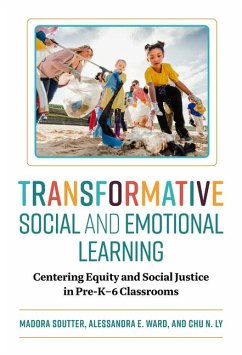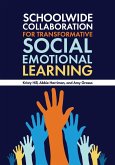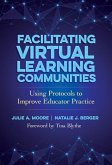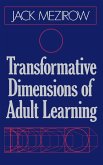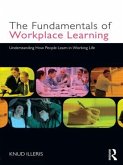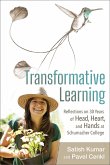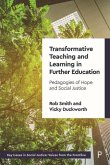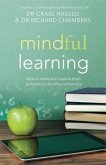Madora Soutter, Alessandra E. Ward, Chu N. Ly
Transformative Social and Emotional Learning
Centering Equity and Social Justice in Pre-K-6 Classrooms
Madora Soutter, Alessandra E. Ward, Chu N. Ly
Transformative Social and Emotional Learning
Centering Equity and Social Justice in Pre-K-6 Classrooms
- Broschiertes Buch
- Merkliste
- Auf die Merkliste
- Bewerten Bewerten
- Teilen
- Produkt teilen
- Produkterinnerung
- Produkterinnerung
Empower young learners to embrace justice through transformative social and emotional learning. The guide offers practical tools, inspiring stories, and adaptable lessons for integrating culturally responsive strategies that foster positive identity development and engage early changemakers.
Andere Kunden interessierten sich auch für
![Schoolwide Collaboration for Transformative Social Emotional Learning Schoolwide Collaboration for Transformative Social Emotional Learning]() Kristy Hill (Fort Worth, TX, USA)Schoolwide Collaboration for Transformative Social Emotional Learning55,99 €
Kristy Hill (Fort Worth, TX, USA)Schoolwide Collaboration for Transformative Social Emotional Learning55,99 €![Facilitating Virtual Learning Communities Facilitating Virtual Learning Communities]() Julie A. MooreFacilitating Virtual Learning Communities49,99 €
Julie A. MooreFacilitating Virtual Learning Communities49,99 €![Transformative Dimensions of Adult Learning Transformative Dimensions of Adult Learning]() Jack MezirowTransformative Dimensions of Adult Learning49,99 €
Jack MezirowTransformative Dimensions of Adult Learning49,99 €![The Fundamentals of Workplace Learning The Fundamentals of Workplace Learning]() Knud Illeris (Denmark. Aarhus University)The Fundamentals of Workplace Learning65,99 €
Knud Illeris (Denmark. Aarhus University)The Fundamentals of Workplace Learning65,99 €![Transformative Learning Transformative Learning]() Transformative Learning17,99 €
Transformative Learning17,99 €![Transformative Teaching and Learning in Further Education Transformative Teaching and Learning in Further Education]() Rob Smith (Birmingham City University)Transformative Teaching and Learning in Further Education37,99 €
Rob Smith (Birmingham City University)Transformative Teaching and Learning in Further Education37,99 €![Mindful Learning Mindful Learning]() Craig HassedMindful Learning17,99 €
Craig HassedMindful Learning17,99 €-
-
-
Empower young learners to embrace justice through transformative social and emotional learning. The guide offers practical tools, inspiring stories, and adaptable lessons for integrating culturally responsive strategies that foster positive identity development and engage early changemakers.
Produktdetails
- Produktdetails
- Verlag: Teachers' College Press
- Seitenzahl: 224
- Erscheinungstermin: 28. März 2025
- Englisch
- Abmessung: 228mm x 160mm x 12mm
- Gewicht: 340g
- ISBN-13: 9780807787069
- ISBN-10: 080778706X
- Artikelnr.: 72003210
- Herstellerkennzeichnung
- Libri GmbH
- Europaallee 1
- 36244 Bad Hersfeld
- gpsr@libri.de
- Verlag: Teachers' College Press
- Seitenzahl: 224
- Erscheinungstermin: 28. März 2025
- Englisch
- Abmessung: 228mm x 160mm x 12mm
- Gewicht: 340g
- ISBN-13: 9780807787069
- ISBN-10: 080778706X
- Artikelnr.: 72003210
- Herstellerkennzeichnung
- Libri GmbH
- Europaallee 1
- 36244 Bad Hersfeld
- gpsr@libri.de
Madora Soutter is an assistant professor of education at Villanova University. Alessandra E. Ward is an assistant professor of education at Wheaton College. Chu N. Ly is an assistant professor of education at Framingham State University.
Contents Acknowledgments
ix Introduction
Why TSEL Matters to Us
3 .
Toward a Transformative Vision of Social and Emotional Learning (SEL)
5 What You'll Learn
5 What Is SEL and Why Does It Matter?
5 Research on Outcomes for Students: Why SEL Matters
7 What Is Transformative Social and Emotional Learning (TSEL) and Why Does It Matter?
8 Transformative SEL: What Is It and How Is It Different From SEL?
Children as Changemakers: Making the Case for TSEL in Elementary Classrooms
4 Closing Thoughts
4 2.
TSEL Planning Toolkit
23 What You'll Learn
23 Identify Your SEL Goals
23 There Are Many Ways to Bring SEL to Your Classroom
2 Infusing SEL and TSEL Into a Sample Lesson
3 Pushing an SEL Curriculum Past Personally Responsible SEL to Transformative SEL
35 Closing Thoughts
42 3.
Integrating Transformative Social and Emotional Learning With Other Domains
45 Contributing Teacher Voices: Christie Brewster and Lindsay Dugan What You'll Learn
45 Starting With Literacy
4 Sample Lesson Plan
49 Integrating SEL With Other Subjects Using Project- Based Learning
5 Thinking Outside the (Homeroom) Box: SEL and Specials
53 Closing Thoughts
55 4.
Supporting Students to Develop Positive Racial Identities
57 Authorship led by Marisha L. Humphries and Ceily Moore Contributing Teacher Voice: Ashley L. McCall What You'll Learn
58 The Importance of Attending to Race From a Transformative SEL Perspective
58 How Children Develop Racial Identity
59 Teacher Self-Reflection and Racial Identity
Culturally and Developmentally Responsive Pedagogical Practices for Supporting Racial Identity Development
4 Challenges and Opportunities in Supporting Students' Racial Identity
9 Closing Thoughts
74 5.
Transformative Play
77 Authored with Rani Pan and Laura A. Hudock Contributing Teacher Voices: Martine Ciccio and Sarah Hurdelbrink What You'll Learn
79 A Self-Reflective Journey, by Rani Pan
79 What Is Play?
8 Play as Pedagogy
82 Personally Responsible Play
83 Participatory Play
8 Transformative Play
88 Integrating Play Into an Existing Curriculum
9 Open-Ended Materials for Play for All Classrooms
9 Closing Thoughts
93 .
Transformative Social-Emotional Learning in Online and Hybrid Environments
95 What You'll Learn
95 Infusing SEL Into Online and Hybrid Spaces: Cultivating Personally Responsible SEL
9 Cultivating Transformative SEL in Online and Hybrid Spaces
99 Building Partnerships and Collaborating With Families
4 Closing Thoughts
7 7.
Professional Learning Communities for Transformative Social and Emotional Learning
9 Authored with Graciela Petrelli, Samantha Simon, Oladimeji Fatoki, and Madelyn Dyer What You'll Learn
What Exactly Are Professional Learning Communities?
Why Are PLCs Effective?
Recommended PLC Structure
2 Sample PLC
2 Closing Thoughts
2 8.
Assessing Transformative Social and Emotional Learning: Holding Ourselves Accountable
23 What You'll Learn
2 Listen to Students
2 Measure Context
29 How Can We Measure Context and How Can It Help?
3 Closing Thoughts
32 9.
Navigating Roadblocks to TSEL
35 What You'll Learn
35 Case Studies and Resources
3 Closing Thoughts
4 .
Integrating Transformative Social and Emotional Learning Into Educator Preparation
47 Contributing Teacher Voices: Susan Donnellan and Sara Donaldson What You'll Learn
48 Where Do Learning Experiences on TSEL Fit in Educator Preparation Programs?
48 What Can an SEL Course Look Like?
5 How Do I Get Support for and Build an SEL Course?
3 Closing Thoughts
7 .
TSEL for Educators
73 What You'll Learn
73 Principle : Strengths-Based Mindset
73 Principle 2: Critical and Transformative Stance
7 Principle 3: Patience and Flexibility
78 Principle 4: Reflection and Action
79 Closing Thoughts
82 References
85 Index
99 About the Authors and Contributors
2 5
ix Introduction
Why TSEL Matters to Us
3 .
Toward a Transformative Vision of Social and Emotional Learning (SEL)
5 What You'll Learn
5 What Is SEL and Why Does It Matter?
5 Research on Outcomes for Students: Why SEL Matters
7 What Is Transformative Social and Emotional Learning (TSEL) and Why Does It Matter?
8 Transformative SEL: What Is It and How Is It Different From SEL?
Children as Changemakers: Making the Case for TSEL in Elementary Classrooms
4 Closing Thoughts
4 2.
TSEL Planning Toolkit
23 What You'll Learn
23 Identify Your SEL Goals
23 There Are Many Ways to Bring SEL to Your Classroom
2 Infusing SEL and TSEL Into a Sample Lesson
3 Pushing an SEL Curriculum Past Personally Responsible SEL to Transformative SEL
35 Closing Thoughts
42 3.
Integrating Transformative Social and Emotional Learning With Other Domains
45 Contributing Teacher Voices: Christie Brewster and Lindsay Dugan What You'll Learn
45 Starting With Literacy
4 Sample Lesson Plan
49 Integrating SEL With Other Subjects Using Project- Based Learning
5 Thinking Outside the (Homeroom) Box: SEL and Specials
53 Closing Thoughts
55 4.
Supporting Students to Develop Positive Racial Identities
57 Authorship led by Marisha L. Humphries and Ceily Moore Contributing Teacher Voice: Ashley L. McCall What You'll Learn
58 The Importance of Attending to Race From a Transformative SEL Perspective
58 How Children Develop Racial Identity
59 Teacher Self-Reflection and Racial Identity
Culturally and Developmentally Responsive Pedagogical Practices for Supporting Racial Identity Development
4 Challenges and Opportunities in Supporting Students' Racial Identity
9 Closing Thoughts
74 5.
Transformative Play
77 Authored with Rani Pan and Laura A. Hudock Contributing Teacher Voices: Martine Ciccio and Sarah Hurdelbrink What You'll Learn
79 A Self-Reflective Journey, by Rani Pan
79 What Is Play?
8 Play as Pedagogy
82 Personally Responsible Play
83 Participatory Play
8 Transformative Play
88 Integrating Play Into an Existing Curriculum
9 Open-Ended Materials for Play for All Classrooms
9 Closing Thoughts
93 .
Transformative Social-Emotional Learning in Online and Hybrid Environments
95 What You'll Learn
95 Infusing SEL Into Online and Hybrid Spaces: Cultivating Personally Responsible SEL
9 Cultivating Transformative SEL in Online and Hybrid Spaces
99 Building Partnerships and Collaborating With Families
4 Closing Thoughts
7 7.
Professional Learning Communities for Transformative Social and Emotional Learning
9 Authored with Graciela Petrelli, Samantha Simon, Oladimeji Fatoki, and Madelyn Dyer What You'll Learn
What Exactly Are Professional Learning Communities?
Why Are PLCs Effective?
Recommended PLC Structure
2 Sample PLC
2 Closing Thoughts
2 8.
Assessing Transformative Social and Emotional Learning: Holding Ourselves Accountable
23 What You'll Learn
2 Listen to Students
2 Measure Context
29 How Can We Measure Context and How Can It Help?
3 Closing Thoughts
32 9.
Navigating Roadblocks to TSEL
35 What You'll Learn
35 Case Studies and Resources
3 Closing Thoughts
4 .
Integrating Transformative Social and Emotional Learning Into Educator Preparation
47 Contributing Teacher Voices: Susan Donnellan and Sara Donaldson What You'll Learn
48 Where Do Learning Experiences on TSEL Fit in Educator Preparation Programs?
48 What Can an SEL Course Look Like?
5 How Do I Get Support for and Build an SEL Course?
3 Closing Thoughts
7 .
TSEL for Educators
73 What You'll Learn
73 Principle : Strengths-Based Mindset
73 Principle 2: Critical and Transformative Stance
7 Principle 3: Patience and Flexibility
78 Principle 4: Reflection and Action
79 Closing Thoughts
82 References
85 Index
99 About the Authors and Contributors
2 5
Contents Acknowledgments
ix Introduction
Why TSEL Matters to Us
3 .
Toward a Transformative Vision of Social and Emotional Learning (SEL)
5 What You'll Learn
5 What Is SEL and Why Does It Matter?
5 Research on Outcomes for Students: Why SEL Matters
7 What Is Transformative Social and Emotional Learning (TSEL) and Why Does It Matter?
8 Transformative SEL: What Is It and How Is It Different From SEL?
Children as Changemakers: Making the Case for TSEL in Elementary Classrooms
4 Closing Thoughts
4 2.
TSEL Planning Toolkit
23 What You'll Learn
23 Identify Your SEL Goals
23 There Are Many Ways to Bring SEL to Your Classroom
2 Infusing SEL and TSEL Into a Sample Lesson
3 Pushing an SEL Curriculum Past Personally Responsible SEL to Transformative SEL
35 Closing Thoughts
42 3.
Integrating Transformative Social and Emotional Learning With Other Domains
45 Contributing Teacher Voices: Christie Brewster and Lindsay Dugan What You'll Learn
45 Starting With Literacy
4 Sample Lesson Plan
49 Integrating SEL With Other Subjects Using Project- Based Learning
5 Thinking Outside the (Homeroom) Box: SEL and Specials
53 Closing Thoughts
55 4.
Supporting Students to Develop Positive Racial Identities
57 Authorship led by Marisha L. Humphries and Ceily Moore Contributing Teacher Voice: Ashley L. McCall What You'll Learn
58 The Importance of Attending to Race From a Transformative SEL Perspective
58 How Children Develop Racial Identity
59 Teacher Self-Reflection and Racial Identity
Culturally and Developmentally Responsive Pedagogical Practices for Supporting Racial Identity Development
4 Challenges and Opportunities in Supporting Students' Racial Identity
9 Closing Thoughts
74 5.
Transformative Play
77 Authored with Rani Pan and Laura A. Hudock Contributing Teacher Voices: Martine Ciccio and Sarah Hurdelbrink What You'll Learn
79 A Self-Reflective Journey, by Rani Pan
79 What Is Play?
8 Play as Pedagogy
82 Personally Responsible Play
83 Participatory Play
8 Transformative Play
88 Integrating Play Into an Existing Curriculum
9 Open-Ended Materials for Play for All Classrooms
9 Closing Thoughts
93 .
Transformative Social-Emotional Learning in Online and Hybrid Environments
95 What You'll Learn
95 Infusing SEL Into Online and Hybrid Spaces: Cultivating Personally Responsible SEL
9 Cultivating Transformative SEL in Online and Hybrid Spaces
99 Building Partnerships and Collaborating With Families
4 Closing Thoughts
7 7.
Professional Learning Communities for Transformative Social and Emotional Learning
9 Authored with Graciela Petrelli, Samantha Simon, Oladimeji Fatoki, and Madelyn Dyer What You'll Learn
What Exactly Are Professional Learning Communities?
Why Are PLCs Effective?
Recommended PLC Structure
2 Sample PLC
2 Closing Thoughts
2 8.
Assessing Transformative Social and Emotional Learning: Holding Ourselves Accountable
23 What You'll Learn
2 Listen to Students
2 Measure Context
29 How Can We Measure Context and How Can It Help?
3 Closing Thoughts
32 9.
Navigating Roadblocks to TSEL
35 What You'll Learn
35 Case Studies and Resources
3 Closing Thoughts
4 .
Integrating Transformative Social and Emotional Learning Into Educator Preparation
47 Contributing Teacher Voices: Susan Donnellan and Sara Donaldson What You'll Learn
48 Where Do Learning Experiences on TSEL Fit in Educator Preparation Programs?
48 What Can an SEL Course Look Like?
5 How Do I Get Support for and Build an SEL Course?
3 Closing Thoughts
7 .
TSEL for Educators
73 What You'll Learn
73 Principle : Strengths-Based Mindset
73 Principle 2: Critical and Transformative Stance
7 Principle 3: Patience and Flexibility
78 Principle 4: Reflection and Action
79 Closing Thoughts
82 References
85 Index
99 About the Authors and Contributors
2 5
ix Introduction
Why TSEL Matters to Us
3 .
Toward a Transformative Vision of Social and Emotional Learning (SEL)
5 What You'll Learn
5 What Is SEL and Why Does It Matter?
5 Research on Outcomes for Students: Why SEL Matters
7 What Is Transformative Social and Emotional Learning (TSEL) and Why Does It Matter?
8 Transformative SEL: What Is It and How Is It Different From SEL?
Children as Changemakers: Making the Case for TSEL in Elementary Classrooms
4 Closing Thoughts
4 2.
TSEL Planning Toolkit
23 What You'll Learn
23 Identify Your SEL Goals
23 There Are Many Ways to Bring SEL to Your Classroom
2 Infusing SEL and TSEL Into a Sample Lesson
3 Pushing an SEL Curriculum Past Personally Responsible SEL to Transformative SEL
35 Closing Thoughts
42 3.
Integrating Transformative Social and Emotional Learning With Other Domains
45 Contributing Teacher Voices: Christie Brewster and Lindsay Dugan What You'll Learn
45 Starting With Literacy
4 Sample Lesson Plan
49 Integrating SEL With Other Subjects Using Project- Based Learning
5 Thinking Outside the (Homeroom) Box: SEL and Specials
53 Closing Thoughts
55 4.
Supporting Students to Develop Positive Racial Identities
57 Authorship led by Marisha L. Humphries and Ceily Moore Contributing Teacher Voice: Ashley L. McCall What You'll Learn
58 The Importance of Attending to Race From a Transformative SEL Perspective
58 How Children Develop Racial Identity
59 Teacher Self-Reflection and Racial Identity
Culturally and Developmentally Responsive Pedagogical Practices for Supporting Racial Identity Development
4 Challenges and Opportunities in Supporting Students' Racial Identity
9 Closing Thoughts
74 5.
Transformative Play
77 Authored with Rani Pan and Laura A. Hudock Contributing Teacher Voices: Martine Ciccio and Sarah Hurdelbrink What You'll Learn
79 A Self-Reflective Journey, by Rani Pan
79 What Is Play?
8 Play as Pedagogy
82 Personally Responsible Play
83 Participatory Play
8 Transformative Play
88 Integrating Play Into an Existing Curriculum
9 Open-Ended Materials for Play for All Classrooms
9 Closing Thoughts
93 .
Transformative Social-Emotional Learning in Online and Hybrid Environments
95 What You'll Learn
95 Infusing SEL Into Online and Hybrid Spaces: Cultivating Personally Responsible SEL
9 Cultivating Transformative SEL in Online and Hybrid Spaces
99 Building Partnerships and Collaborating With Families
4 Closing Thoughts
7 7.
Professional Learning Communities for Transformative Social and Emotional Learning
9 Authored with Graciela Petrelli, Samantha Simon, Oladimeji Fatoki, and Madelyn Dyer What You'll Learn
What Exactly Are Professional Learning Communities?
Why Are PLCs Effective?
Recommended PLC Structure
2 Sample PLC
2 Closing Thoughts
2 8.
Assessing Transformative Social and Emotional Learning: Holding Ourselves Accountable
23 What You'll Learn
2 Listen to Students
2 Measure Context
29 How Can We Measure Context and How Can It Help?
3 Closing Thoughts
32 9.
Navigating Roadblocks to TSEL
35 What You'll Learn
35 Case Studies and Resources
3 Closing Thoughts
4 .
Integrating Transformative Social and Emotional Learning Into Educator Preparation
47 Contributing Teacher Voices: Susan Donnellan and Sara Donaldson What You'll Learn
48 Where Do Learning Experiences on TSEL Fit in Educator Preparation Programs?
48 What Can an SEL Course Look Like?
5 How Do I Get Support for and Build an SEL Course?
3 Closing Thoughts
7 .
TSEL for Educators
73 What You'll Learn
73 Principle : Strengths-Based Mindset
73 Principle 2: Critical and Transformative Stance
7 Principle 3: Patience and Flexibility
78 Principle 4: Reflection and Action
79 Closing Thoughts
82 References
85 Index
99 About the Authors and Contributors
2 5

